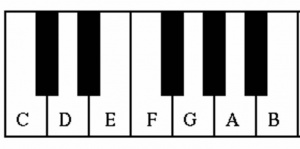Difference between revisions of "Language/Multiple-languages/Vocabulary/Musical-Notes-in-Many-Languages"
< Language | Multiple-languages | Vocabulary
Jump to navigation
Jump to search
| Line 51: | Line 51: | ||
The English system below is commonly understood internationally: | The English system below is commonly understood internationally: | ||
[[File:notes-piano.jpg]] | [[File:notes-piano.jpg|thumb|none]] | ||
<youtube>5x8-PCjuEHQ</youtube> | <youtube>5x8-PCjuEHQ</youtube> | ||
Revision as of 15:57, 29 May 2022
How to write musical notes in different languages
Music is also said to be a language on its own.
In most of the romance language speaking countries (Spain, Portugal, Italy, France, etc.) music notes are named DO, RE, MI, FA, SOL, LA, SI while in some other countries each note is named with a letter C, D, E, F, G, A, B.
How to write notes in different languages
In the table below, you will learn the system used for several languages.
Feel free to add more languages in the table below (by editing this wiki page):
| English | German | Japanese | Korean | Italian, Spanish, Turkish, Chinese | French | Portuguese | Russian | Greek | Thai |
|---|---|---|---|---|---|---|---|---|---|
| C | C | ハ (ha) | da | Do | Do | Dó | До (Do) | Ντο (Do) | โด |
| D | D | 二 (ni) | ra | Re | Ré | Ré | Ре (Re) | Ρε (Re) | เร |
| E | E | ホ (ho) | ma | Mi | Mi | Mi | Ми (Mi) | Μι (Mi) | มี |
| F | F | へ (he) | ba | Fa | Fa | Fá | Фа (Fa) | Φα (Fa) | ฟา |
| G | G | ト (to) | sa | Sol | Sol | Sol | Соль (Sol) | Σολ (Sol) | ซอล |
| A | A | ヒ (hi) | ga | La | La | Lá | Ля (Lja) | Λα (La) | ลา |
| B | H | ロ (ro) | na | Si | Si | Si | Си (Si) | Σι (Si) | ที |
English system
The English system below is commonly understood internationally:

